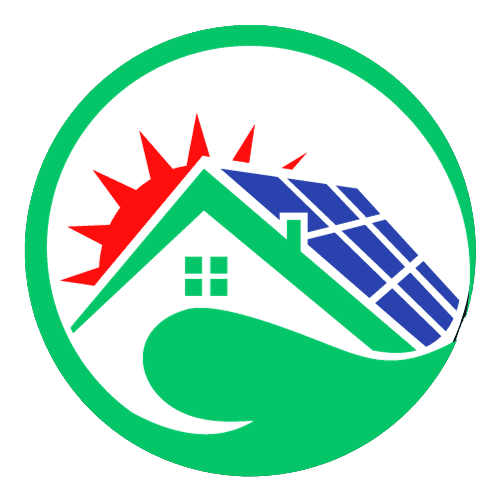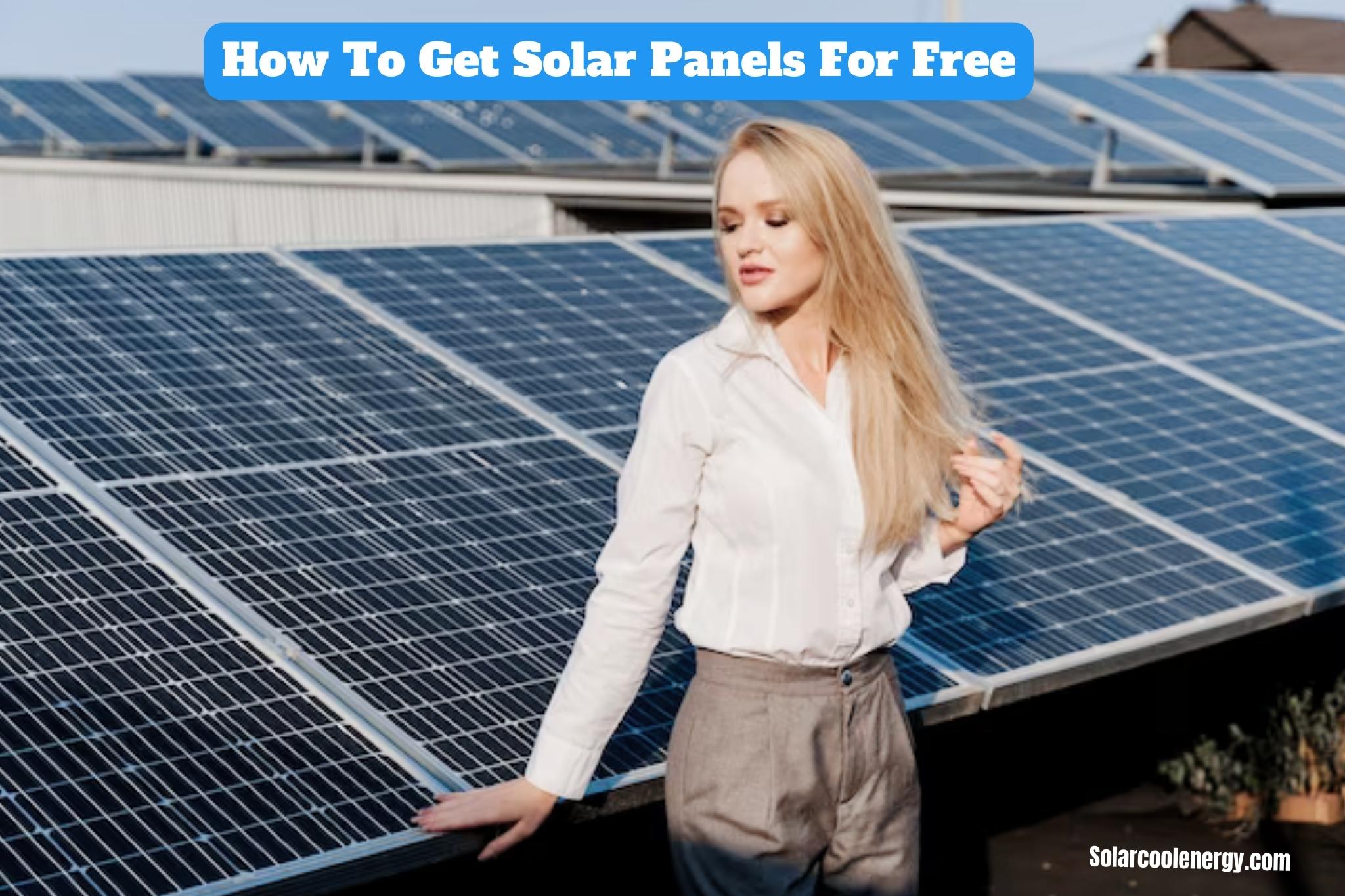To get solar panels for free, you can explore government programs or non-profit organizations that offer free installation and panels. Additionally, you can look into financing options such as solar leases or power purchase agreements that require little to no upfront costs.
However, it’s important to note that “free” solar panels often come with certain conditions and may not cover the entire cost of installation. It’s recommended to research and compare different options available in your area to find the best solution for your needs.
Remember to consider factors such as tax incentives, maintenance costs, and payback period when evaluating the overall cost-savings of solar panel installations.

Credit: Youtube
Unveiling Free Solar Panel Opportunities
Are you interested in harnessing the power of solar energy but worried about the cost? Well, you’ll be glad to know that there are free solar panel opportunities available to help you go green without breaking the bank. In this article, we will uncover the reality behind these no-cost solar solutions, allowing you to make an informed decision about your energy needs. Let’s dive right in!
Understanding The Premise Of “free” Solar Options
When it comes to free solar panel options, it’s important to understand the underlying premise. While it may seem too good to be true, there are actually legitimate ways to obtain solar panels at no cost. These opportunities typically involve partnerships between solar companies, government initiatives, nonprofits, or financial programs. They aim to make solar energy accessible to a wider range of individuals, helping to reduce carbon footprints and promote sustainability.
The Reality Behind No-cost Solar Solutions
Now, let’s delve into the reality behind these no-cost solar solutions. It’s essential to approach these opportunities with a clear understanding of what they entail. While the panels themselves may be provided at no cost, there are often other factors to consider, such as installation, maintenance, and financing options.
- Installation: While you may receive free solar panels, there will typically be installation costs involved. These costs vary depending on your location, the size of your solar system, and any additional electrical work required. It’s vital to factor in these installation costs when considering the overall affordability of the free solar opportunity.
- Maintenance: Solar panels must be serviced on a regular basis to guarantee peak performance. While the panels themselves may be free, you will still be responsible for maintaining them. This includes cleaning, replacing inverters, and monitoring overall system health. It’s important to consider these ongoing maintenance costs when evaluating the long-term benefits of free solar options.
- Financing options: In some cases, free solar panel opportunities may offer financing options to help cover installation and maintenance costs. These options often involve low or no-interest loans, leasing agreements, or power purchase agreements. It’s crucial to carefully review the terms and conditions of these financing options to ensure they align with your financial goals.
By understanding the realities behind no-cost solar solutions, you can make a well-informed decision about whether they are the right fit for your solar energy journey. Remember, while the panels themselves may be free, there are still associated costs to consider. It’s essential to weigh these costs against the long-term benefits and savings provided by solar energy.
In conclusion, while obtaining free solar panels may require careful consideration, they can be a fantastic way to reduce your reliance on traditional energy sources and make a positive impact on the environment. Keep an eye out for reputable free solar panel opportunities in your area and take advantage of the benefits of solar energy without the hefty price tag.
Eligibility For Free Solar Programs
Discover if you qualify for free solar programs and learn how to get solar panels for free. Explore government initiatives, state-funded programs, and shared programs by solar companies to help you convert to solar energy without upfront costs.
Qualifying For State-funded Initiatives
If you’re interested in getting solar panels for free, state-funded initiatives can be a great option to explore. Many states offer various programs that provide financial assistance or rebates to homeowners who want to switch to solar energy. These initiatives are often aimed at promoting renewable energy adoption and reducing carbon emissions.
To qualify for state-funded initiatives, you typically need to meet certain eligibility criteria set by the state government. These criteria may vary from state to state but commonly include factors such as:
- Your income level: Some programs are specifically designed to assist low-income households, while others may have income caps.
- Your property type: Certain programs may only be available for residential properties, while others may also include commercial buildings.
- Your location: Some state-funded initiatives may prioritize areas with high solar potential or areas that have a high need for increased renewable energy usage.
- The condition of your property: Programs might require your property to meet certain structural and electrical requirements to ensure the efficient installation and operation of solar panels.
It’s important to check with your state’s energy department or relevant government agency to determine the specific requirements and availability of state-funded initiatives in your area. They can provide you the information you need and walk you through the application process.
Federal Tax Credits And Solar Incentives
In addition to state-funded initiatives, there are federal tax credits and incentives that can help make solar panels more affordable. The federal government offers a tax credit called the Residential Renewable Energy Tax Credit, which allows homeowners to claim a percentage of their solar installation costs as a credit on their tax return.
To be eligible for this tax credit, there are a few requirements:
- The solar panels must be installed on your primary residence.
- The system must be in compliance with all applicable building codes and regulations.
- The panels must be placed in service before the end of the tax year for which you’re claiming the credit.
It’s important to consult with a tax professional or visit the Internal Revenue Service (IRS) website to ensure you meet all the eligibility criteria and understand the current tax credit percentage.
Nonprofit Organizations Offering Free Solar
Several nonprofit organizations are dedicated to making solar energy accessible to low-income households and underserved communities. These organizations work on a donation-based model where they receive funding from individuals, corporations, and government grants to cover the cost of solar panel installation for eligible homeowners.
Some organizations also offer financing options like zero-interest loans or income-based repayment plans to further alleviate the financial burden. By collaborating with local solar installers, these nonprofits ensure that qualified individuals can enjoy the benefits of clean and renewable energy without having to worry about the upfront costs.
It’s essential to research and reach out to reputable nonprofit organizations in your area that provide free solar programs. They can assist you in assessing your eligibility, guiding you through the application process, and connecting you with the necessary resources.

How To Get Solar Panels For Free
Are you interested in harnessing the power of solar energy but worried about the cost of solar panel installation? Fortunately, there are ways to get solar panels for free and make a positive impact on both the environment and your wallet. In this article, we will explore various methods for obtaining free solar panels and the steps involved in applying for these programs.
Identifying Applicable Government Programs
If you’re looking to acquire solar panels at no cost, it’s crucial to identify applicable government programs that offer financial assistance or incentives. These programs vary depending on your location, so it’s essential to research the offerings in your area. Check with federal, state, and local governments to see if there are any grants, tax credits, or rebates available for solar panel installation. Take advantage of online resources and portals specifically designed to help homeowners find government-funded solar programs in their region.
Exploring Local And Non-profit Solar Installations
Another avenue to obtain free solar panels is through local or non-profit organizations that offer solar installation services. These organizations often have partnerships with government agencies, corporations, or charitable foundations that fund solar panel projects for eligible homeowners. Research local solar cooperatives, community solar projects, or non-profit organizations dedicated to renewable energy initiatives in your area. These institutions may have programs in place to provide solar panels at no cost or offer low-interest loans or affordable leasing options.
Steps To Applying For Free Solar Panel Programs
Once you have identified applicable government programs or explored local and non-profit solar installations, follow these steps to apply for free solar panel programs:
- Research the eligibility criteria for each program to ensure that you meet the requirements.
- Collect the necessary documentation, such as proof of ownership, identification, and income verification.
- Complete the application forms precisely and give all necessary information. Be sure to highlight any special circumstances that may increase your chances of acceptance.
- Submit the completed application along with the required documents within the specified timeframe.
- Wait for the program administrators to review your application and make a decision. Keep in mind that this can take a while.
- If your application is approved, work closely with the program administrators to finalize the installation details and schedule the solar panel setup.
- Ensure you understand any maintenance or contract obligations associated with the free solar panel program.
- Enjoy the benefits of solar energy at no cost to you while contributing to a greener environment!
By following these steps and taking advantage of available resources, you can potentially get solar panels for free. Remember, it’s crucial to research your options thoroughly, gather all necessary documentation, and submit your application accurately and on time. Don’t hesitate to reach out to government agencies, non-profit organizations, or local solar installation companies for guidance throughout the process. Installing solar panels can lead to long-term savings and reduce your carbon footprint, making it a worthwhile investment for both your financial future and the planet.
Evaluating Solar Lease Agreements
Evaluate solar lease agreements to potentially get solar panels for free. Understand the terms and conditions, maintenance responsibilities, and any tax incentives involved before committing to a lease agreement. Consider owning the panels for long-term benefits.
Benefits And Drawbacks Of Solar Leasing
When it comes to getting solar panels for free, one option to consider is a solar lease agreement. Solar leasing allows you to enjoy the benefits of solar energy without the upfront costs of purchasing and installing the panels.
Benefits of solar leasing:
| Advantages | |
|---|---|
| 1. No upfront costs: | With a solar lease, you don’t have to pay for the panels upfront. Instead, you pay a monthly lease payment, which is often lower than your previous electricity expenses. |
| 2. Maintenance included: | Most solar lease agreements include maintenance and repairs, so you don’t have to worry about any additional expenses. |
| 3. Easy installation: | When you lease solar panels, the installation is typically taken care of by the leasing company, making the process hassle-free for you. |
| 4. Immediate savings: | Once the panels are installed, you’ll start saving on your electricity bills right away, as the solar energy generated will offset a significant portion of your power usage. |
Drawbacks of solar leasing:
- 1. Long-term commitment: Solar lease agreements typically require a long-term commitment, often ranging from 10 to 20 years. Consider whether you are comfortable with this duration before signing the agreement.
- 2. Limited control: When you lease solar panels, you don’t have full ownership or control over the system. Some decisions regarding installation or maintenance may need to be approved by the leasing company.
- 3. No access to tax credits: As a lessee, you may not be eligible for certain federal solar tax credits or incentives. These financial benefits usually apply to owners of solar panel systems.
Understanding Power Purchase Agreements (ppas)
Another option to get solar panels for free is through a power purchase agreement (PPA). Similar to a solar lease, a PPA allows you to use solar energy without the upfront costs of installation and ownership.
The solar panels on your property are installed and maintained by a third-party solar firm under a PPA.
Instead of paying for the panels, you agree to purchase the electricity generated by the panels at a predetermined rate. This rate is often lower than your current utility rate, resulting in immediate savings on your electricity bills.
It’s important to note that the solar company remains the owner of the panels, and you only pay for the electricity produced. PPAs usually have long-term contracts, ranging from 10 to 25 years, so ensure you fully understand the terms before entering into an agreement.
Comparing Ownership Vs. Leasing Solar Panels
When considering how to get solar panels for free, it’s essential to compare the benefits and drawbacks of owning the panels versus leasing them.
Ownership: With ownership, you have full control over the system and are eligible for federal tax credits and incentives. You’ll also benefit from any increase in the value of your property and have the flexibility to choose your preferred solar installation company.
Leasing: Leasing allows you to enjoy the benefits of solar energy without the upfront costs. However, you may have less control and limited access to tax credits or incentives. Leasing is a good option if you want immediate savings on your electricity bills without the hassle of installation and maintenance.
Consider your long-term goals, financial situation, and preferences before deciding whether to own or lease solar panels. Take your time thinking about your options and choose the one that works best for you.
Resources For Solar Panel Grants
Obtaining solar panels for free might seem like a dream, but it is possible through various resources and grants available for homeowners. In this section, we will explore how you can find and apply for solar grants, utilize online solar calculators and databases, and provide tips for successful grant application submissions.
Finding And Applying For Solar Grants
One of the best ways to get solar panels for free is through solar grants offered by government and non-profit organizations. These grants are designed to incentivize homeowners to adopt renewable energy and reduce their carbon footprint. To find available solar grants in your area:
- Visit the official websites of government agencies and organizations involved in renewable energy.
- Search for keywords like “solar grants” or “renewable energy grants” on search engines.
- Explore renewable energy associations and non-profit organizations that offer funding for solar projects.
Look over the application instructions and eligibility requirements for each award that you’re interested in applying for. Keep in mind that competition for solar grants can be fierce, so it’s crucial to put together a strong application that highlights the environmental and economic benefits of solar energy.
Utilizing Online Solar Calculators And Databases
Before applying for solar grants, it’s essential to evaluate the feasibility and cost-effectiveness of installing solar panels on your property. Online solar calculators and databases can help you determine the potential savings and return on investment of going solar.
- Use online solar calculators to estimate your current energy usage, potential savings, and payback period for installing solar panels.
- Explore online databases that provide information on available solar incentives, tax credits, and financing options in your area.
- Compare different solar panel brands, technologies, and installation costs through online resources to make informed decisions.
By utilizing these online tools, you can make a more informed decision about solar panel installation and gather the necessary data for grant applications.
Tips For Successful Grant Application Submissions
Submitting a successful grant application requires careful preparation and attention to detail. Here are some tips to increase your chances of securing a solar grant for free panels:
- Read and understand the grant guidelines thoroughly to ensure your project aligns with the grant’s objectives.
- Prepare a well-written project proposal that clearly outlines the environmental benefits, energy savings, and community impact of your solar panel installation.
- Include supporting documents such as quotes from solar installers, energy efficiency plans, and testimonials from satisfied customers.
- Provide a detailed budget and timeline for the installation to demonstrate your organization’s commitment and ability to complete the project.
- Follow the grant submission instructions carefully, providing all required documents and information in the specified format.
By following these tips, you can present a compelling case for why you should be awarded a solar grant, increasing your chances of getting free solar panels.

Frequently Asked Questions For How To Get Solar Panels For Free
Will The State Of Texas Pay For Solar Panels?
The state of Texas does not offer a program to pay for solar panels. However, there is a property tax exemption for renewable energy systems in residential and commercial properties.
What Is The Florida No Cost Solar Program?
The Florida no cost solar program allows residents to convert to solar energy without any out-of-pocket expenses. Solar companies, installers, and financial companies collaborate to make solar energy more accessible and affordable for Florida residents.
How Much Does It Cost For One Solar Panel?
The cost of one solar panel varies, but on average, it can range from $150 to $500.
How Long Does It Take Solar Panels To Pay For Themselves?
Return on investment (ROI) for solar panels typically falls between six and 10 years. Many factors influence the time it takes to pay off the panels and the monthly savings you can expect.
Conclusion
Getting solar panels for free may seem like a dream, but with the right resources and knowledge, it can become a reality. By exploring government programs, nonprofit organizations, and state incentives, you can significantly reduce or eliminate the cost of solar panel installation.
Additionally, considering options like solar leases and power purchase agreements can provide you with the benefits of solar energy without the upfront costs. Embracing solar power is not only beneficial for the environment but can also result in long-term cost savings.
Start your journey towards free solar panels today!

